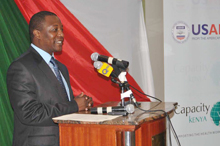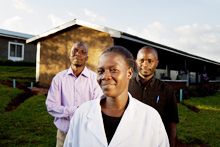
Assessment Recommends Ways to Strengthen Kenya’s Health Training System
Kenya is taking steps to strengthen its health training systems so that graduates can provide the care needed to improve health outcomes of the Kenyan people, toward Vision 2030. Preliminary findings of a performance needs assessment conducted in public, faith-based, and private-sector health facilities and training institutions were released at an event on September 29. The USAID-funded Capacity Kenya project conducted the country-wide assessment in collaboration with the Ministry of Medical Services, Ministry of Public Health and Sanitation, and faith-based and private organizations.
The USAID-funded Capacity Kenya project conducted the country-wide assessment in collaboration with the Ministry of Medical Services, Ministry of Public Health and Sanitation, and faith-based and private organizations.
Led by IntraHealth International, Capacity Kenya builds on the success of the USAID-funded Capacity Project, which preceded CapacityPlus.
Assistant Minister of Medical Services Samuel Kazungu Kambi said the findings provide “an opportunity for us to learn and improve the training system by putting in place measures that will strengthen the capacity of health workers to improve their performance.”
He added that the government is determined to strengthen health systems at the national and county level so as to meet international standards and respond to new and emerging health challenges.  The assessment’s preliminary findings are in sync with Kenya’s Human Resources for Health (HRH) Strategic Plan 2009–2012. The HRH plan calls for regular curriculum review and development to meet local needs and maintain high levels of management of the critical staff who deliver services.
The assessment’s preliminary findings are in sync with Kenya’s Human Resources for Health (HRH) Strategic Plan 2009–2012. The HRH plan calls for regular curriculum review and development to meet local needs and maintain high levels of management of the critical staff who deliver services.
“The preliminary findings of this assessment should be used to improve curriculum for training of health workers so that it meets specific needs of the health sector,” Kambi said.
Among the recommendations in the report of preliminary findings is the need to strengthen linkages in the training system, enhance clinical placements, provide more resources—especially in information and communication technology, increase opportunities in training faculty and clinical instructors in content and teaching methods, and reduce educational and occupational segregation, sexual harassment, and pregnancy discrimination.
Photos: 1) Assistant Minister Kambi addresses stakeholders during the release of preliminary findings (photo courtesy of Daniel Kapsoot). 2) Health workers in Kenya (photo by Trevor Snapp).


